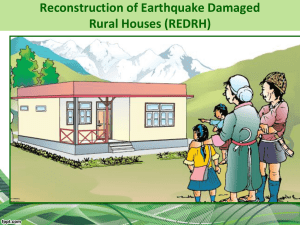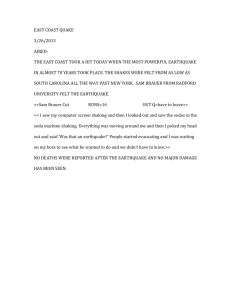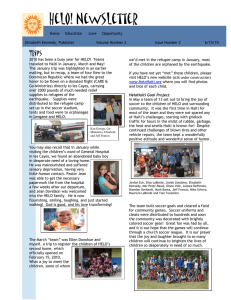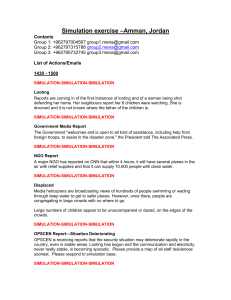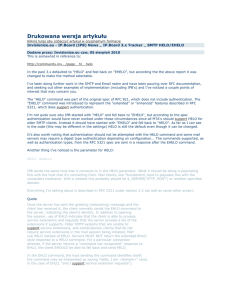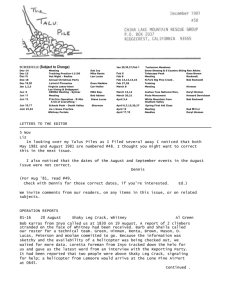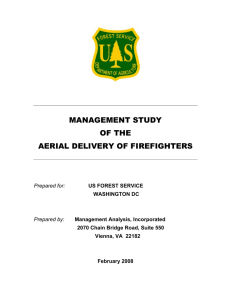150514_ocha_rapid_assessment_mission_charikot
advertisement
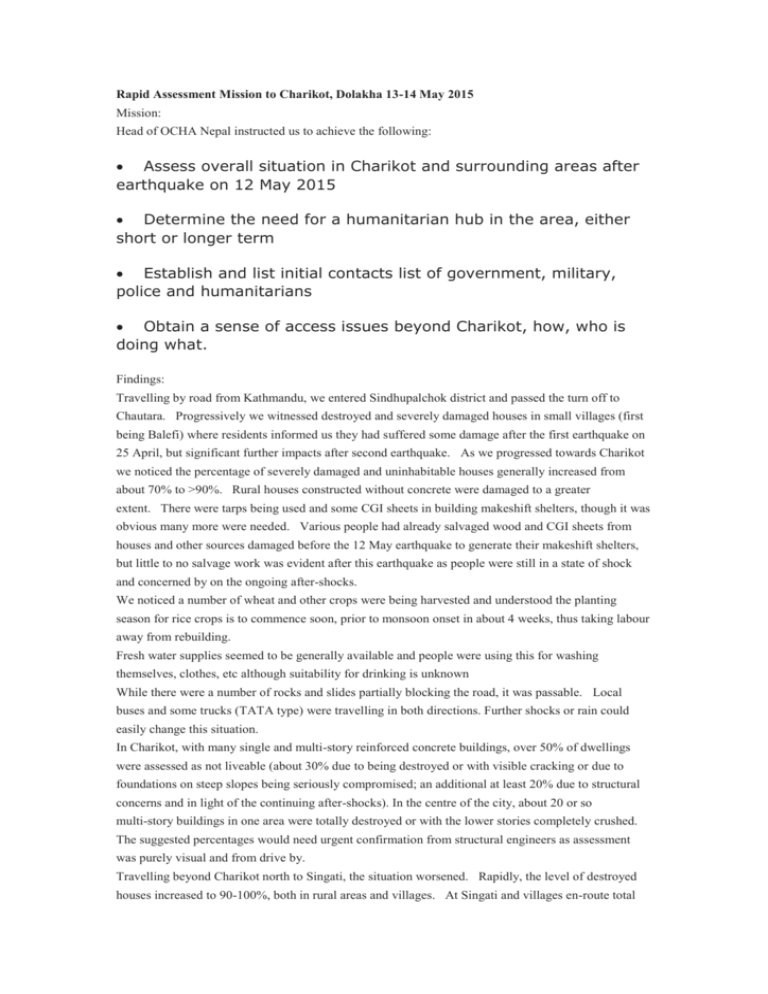
Rapid Assessment Mission to Charikot, Dolakha 13-14 May 2015 Mission: Head of OCHA Nepal instructed us to achieve the following: Assess overall situation in Charikot and surrounding areas after earthquake on 12 May 2015 Determine the need for a humanitarian hub in the area, either short or longer term Establish and list initial contacts list of government, military, police and humanitarians Obtain a sense of access issues beyond Charikot, how, who is doing what. Findings: Travelling by road from Kathmandu, we entered Sindhupalchok district and passed the turn off to Chautara. Progressively we witnessed destroyed and severely damaged houses in small villages (first being Balefi) where residents informed us they had suffered some damage after the first earthquake on 25 April, but significant further impacts after second earthquake. As we progressed towards Charikot we noticed the percentage of severely damaged and uninhabitable houses generally increased from about 70% to >90%. Rural houses constructed without concrete were damaged to a greater extent. There were tarps being used and some CGI sheets in building makeshift shelters, though it was obvious many more were needed. Various people had already salvaged wood and CGI sheets from houses and other sources damaged before the 12 May earthquake to generate their makeshift shelters, but little to no salvage work was evident after this earthquake as people were still in a state of shock and concerned by on the ongoing after-shocks. We noticed a number of wheat and other crops were being harvested and understood the planting season for rice crops is to commence soon, prior to monsoon onset in about 4 weeks, thus taking labour away from rebuilding. Fresh water supplies seemed to be generally available and people were using this for washing themselves, clothes, etc although suitability for drinking is unknown While there were a number of rocks and slides partially blocking the road, it was passable. Local buses and some trucks (TATA type) were travelling in both directions. Further shocks or rain could easily change this situation. In Charikot, with many single and multi-story reinforced concrete buildings, over 50% of dwellings were assessed as not liveable (about 30% due to being destroyed or with visible cracking or due to foundations on steep slopes being seriously compromised; an additional at least 20% due to structural concerns and in light of the continuing after-shocks). In the centre of the city, about 20 or so multi-story buildings in one area were totally destroyed or with the lower stories completely crushed. The suggested percentages would need urgent confirmation from structural engineers as assessment was purely visual and from drive by. Travelling beyond Charikot north to Singati, the situation worsened. Rapidly, the level of destroyed houses increased to 90-100%, both in rural areas and villages. At Singati and villages en-route total devastation was evident, with the locals stating the majority of damage had occurred on 12 May. They were in a state of constant fear due to ongoing after-shocks and unable to make any forward plans as yet. Food was in short supply, many not having eaten for days but distributions by local NGOs were occurring along the way. The fresh water supply (tank and piping) in Singati was destroyed and water was being scrounged. Bodies were still to be retrieved from collapsed buildings. The road to Singati was unpaved, had various large cracks and debris across it but was just passable up to the outskirts of Singati having been cleared the day before, but unpassable thereafter. Further shocks or rain would likely make conditions more difficult. Discussions with the CDO, LDO, DIG Central Region, Plan International and NRCS members highlighted the need for urgent additional humanitarian assistance, with associated coordination support. In addition, while in a discussion with the Army Chief, he flagged an acute need of reinforcing the existing mechanism to deal with the response initiatives at the district level which is DDRC led by the CDO. Immediate priorities were shelter closely followed by food. But it was obvious to us that other aspects of WASH, livelihoods, health, education, psychosocial support, and protection will quickly surface as important issues. Discussions with partners highlighted that the majority of schools, clinics and other essential services were non-operational due to damaged buildings and infrastructure. Transportation of goods into the northern half of the district beyond Singati is impossible by ground, requiring helo support. Currently helo support is severely limited with only several small helos operating continually – US aircraft are currently not supporting logistics efforts, being tied up with searching for their missing helo. Further large helo support was identified by many we spoke to as a very high priority. With the expected onset of the monsoon in about 4 weeks time, a limited window of opportunity was stated to be available to address the urgent humanitarian needs, to offset a possible 2 nd wave of increased needs. Provision of CGI sheeting in preference to tarps was stated to address the upcoming monsoon conditions. But prior to the onset of winter in 6 months time, better housing solutions will be required. Recommendations: 1. Accept there are serious humanitarian needs in the Dolakha district which should be addressed urgently prior to the upcoming monsoon and the later winter period. 2. While the initially highlighted needs were identified as shelter and food, all infrastructure associated with other services have been seriously affected requiring support in all other sectors. 3. Coordination needs are evident due to the required and anticipated increased number humanitarian actors. 4. Logistics challenges are significant and specifically require short term helo and other resources. 5. While access is currently difficult, it will become even more so with the approaching monsoon. Contacts details obtained will be provided separately. Mel Schmidt (OCHA) Pindat (RC’s Office) 14 May 2015 Regards Mel Schmidt Jake Zarins (Shelter Cluster) Suresh


